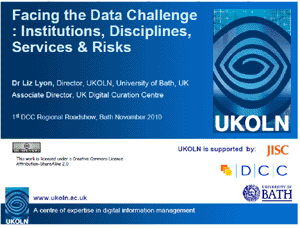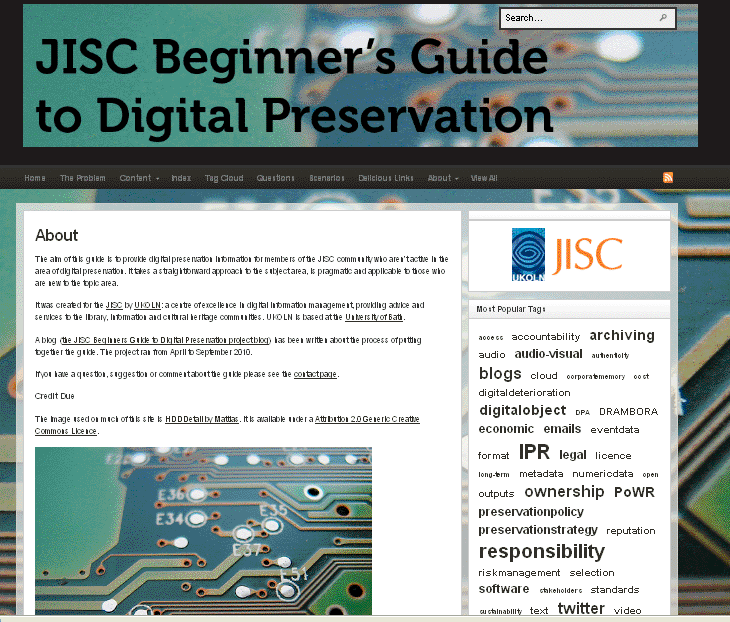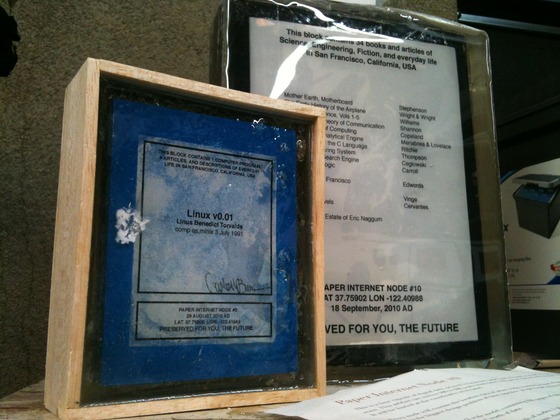
Last week the Digital Curation Centre (DCC) ran a series of inter-linked workshops aimed at supporting institutional data management, planning and training. The roadshow will travel round the UK but the first one was held in central Bath. The event ran over 3 days and provided Institutions with advice and guidance tailored to a range of different roles and responsibilities.
Day one (Tuesday 2nd November) looked the Research Data Landscape and offered a selection of case studies highlighting different models, approaches and working practice. Day two (Wednesday 3rd November) considered the research data challenge and how we can develop an institutional response. Day three (Thursday 4th November) comprised of 2 half-day training workshops: Train the Trainer and Digital Curation 101.
Unfortunately due to other commitments I could only make the second day of the roadshow, but found it really useful and would thoroughly recommend anyone interested in institutional curation of research data to attend the next workshop (to be held in Sheffield early next year – watch this space!).
The Research Data Challenge: Developing an Institutional Response

Liz Lyon Presenting
Day two of the roadshow was aimed at high-level managers and researchers with the intention of getting them to work together to identify first steps in developing an institutional strategic plan for research data management support and service delivery. Although there was a huge amount of useful information to take in (if only I’d come across more of it when writing the Beginner’s Guide! Currently waiting for the go ahead for release.) it was very much a ‘working day’. We were to get our hands dirty looking at real research curation and preservation situations in our own institutions.
After coffee and enjoying some of the biggest biscuits I’ve seen we were introduced to the DCC and given a quick overview by Kevin Ashley, Director DCC, University of Edinburgh. The majority of the day was facilitated by Dr Liz Lyon, Associate Director, DCC and Director of UKOLN, University of Bath. Liz reiterated the research data challenge we face but pointed out that there are both excellent case-studies and excellent tools now available for our use. Two that are worth highlighting here are DMP Online (DCC’s data management planning tool) and University of Southampton’s IDMB: Institutional data management blueprint. The slides Liz used during the day were excellent, they are available from the DCC Web site in PPT format and can be downloaded as a PDF from here.

During the day we worked in groups on a number of exercises. The idea is that we would start fairly high level and then drill down into more specific actions. In the first exercise my group took a look at motivations and benefits for research data management and the barriers that are currently in place. Naturally the economic climate was mentioned a fair amount during the day but some of the long-standing issues still remain: where responsibility lies, lack of skills, lack of a coherent framework, taking data out of context, storage issues and so on. After our feedback Liz gave another plenary on Reviewing Data Support Services: Analysis, Assessment, Priorities. The key DCC key tool in this area is the Data Asset Framework (formerly the Data Audit Framework) which provides organisations with the means to identify, locate, describe and assess how they are managing their research data assets – very useful for prioritising work. Useful reports include those from the Supporting Data Management Infrastructure for the Humanities (Sudamih) project. There was a feeling that looking into this area was becoming easier, people tend to be more open than they were a few years back, there is definitely groundswell.

Group Exercises
In exercise 2 we carried out a SWOT analysis of current research data. In the feedback there were a few mentions of the excellent Review of the State of the Art of the Digital Curation of Research Data by Alex Ball. Liz also provided us with a useful resources list (in her slides).
After an excellent lunch and a very brief break (no time to rest when sorting out HE’s data problems!) we returned to another plenary by Liz on Building Capacity and Capability in your Institution: Skills, Roles, Resources whih laid the groundwork for exercise 3 –
a skills and services Audit. This exercise required us to think about the various skills needed for data curation and align them with people in our institutions. There was a recognition that librarians do ‘a lot’ and are more than likely to become the hub for activity in the future. There was also a realisation that there is a fair number of gaps (for example around provenance) and that there can be a bit of a hole between the creation of data by researchers and the passing on of curated data to librarians. Another reason why we need to create more links with our researchers. Again lots of excellent resources that I hope to return to including Appraise & Select Research Data for Curation by Angus Whyte, Digital Curaton Centre, and Andrew Wilson, Australian National Data Service.
Liz then gave her final plenary on Developing a Strategic Plan for Research Data Management: Position, Policy, Structure and Service Delivery. The suggestions on optimising organisational support and looking at quick wins put us in the right frame of mind for the final exercise – Planning Actions and Timeframe. We were required to lay down our ‘real’ and aspirational actions for the short-term (0-12 months), medium-term (1-36 months) and long term (over 3 years). A seriously tricky task! The feedback reflected on the situation we are currently in economically and how it offers us as many opportunities as clallenges. Now is a better time than ever for reform and for information services to take on a leadership role. Kevin Ashley concluded the day with some thoughts on the big who, how and why issues. He stressed that training is so important at the moment. Many skills are in short supply and employing new staff is not an option so reskilling your staff is essential.

Flickr photos from the day (include photos of the flip chart pages created) are available from the UKOLN Flickr page and brief feedback videos are available from the UKOLN Vimeo page. There is also a Lanyard entry for the roadshow. The event tag was #dccsw10.







